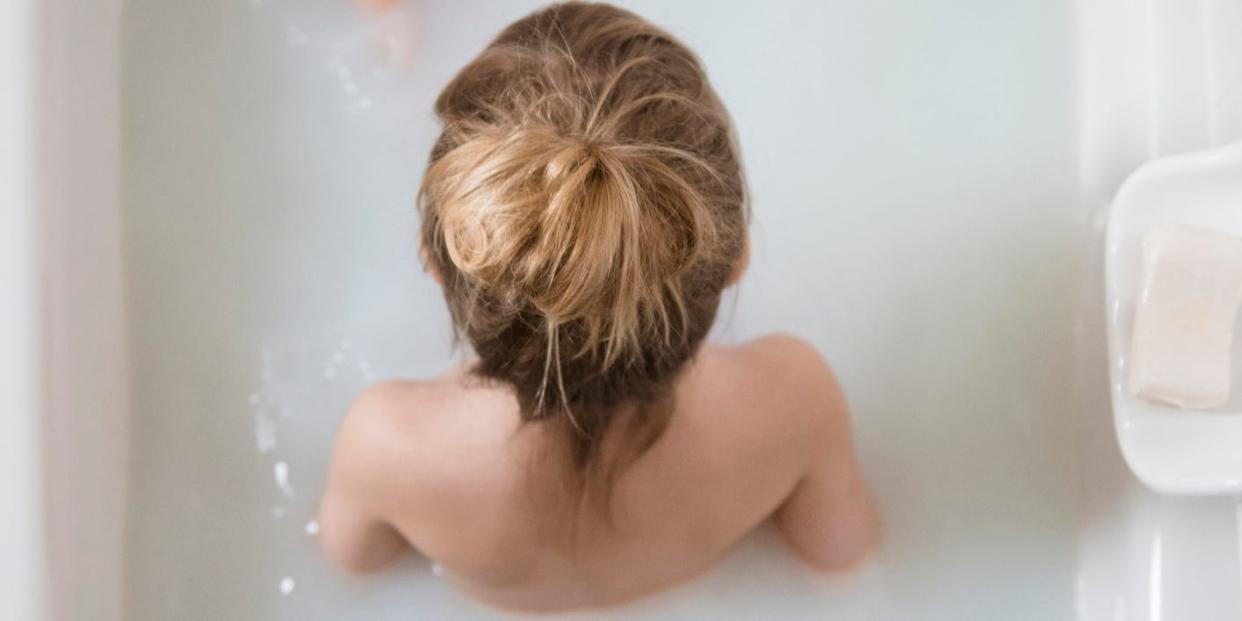How to make an oatmeal bath to soothe and moisturize skin, according to dermatologists

Oatmeal baths are warm baths containing finely ground oatmeal which can soothe and moisturize skin.
Oatmeal baths are beneficial for those with acne, dry skin, itchy skin, psoriasis, and rashes.
To make an oatmeal bath add colloidal oats to warm water and soak for at least 15 minutes.
Soaking in an oatmeal bath - a warm bath that contains finely ground oatmeal - can soothe skin conditions and irritations such as eczema, poison ivy, and bug bites.
Oatmeal baths aren't just for adults, they're great for babies too - especially for treating diaper rash.
Here's what you need to know about the benefits of oatmeal baths and how to make one for you or your baby.
Oatmeal bath benefits
If you're dealing with a skin condition or irritation, there's a good chance an oatmeal bath can help. "The oatmeal acts as an emollient and protective moisturizer for dry skin," says Azza Halim, MD, a physician with her own practice.
Medical term: Emollients are lotions, creams, or other products that form a protective layer over the skin, thereby trapping in moisture.
Oatmeal contains a variety of nutrients such as proteins, fats, and vitamins - like vitamin E - which makes it especially good at binding, cleansing, and hydrating the skin.
According to Michele Green, MD, a cosmetic dermatologist with her own practice, oatmeal can soothe a wide variety of skin conditions, including:
Rashes, including diaper rash
Sunburn
Chickenpox
Psoriasis
Latest research: In a small 2020 study, people with chronic irritant hand eczema who used a cream containing oatmeal saw a reduction in symptoms such as severity and itchiness compared to those who used a cream without it.
After just one oatmeal bath, your skin may feel softer and smoother. However, it may take a few weeks of once-weekly oatmeal baths for ongoing irritations to become less inflamed, says Green.
How to make an oatmeal bath
Not only are oatmeal baths beneficial, but they are easy to make, requiring just two ingredients: oats and water.
While you can use regular oats for an oatmeal bath, it's best to choose colloidal oats - a finely ground oat designated by the FDA as a skin protectant. Colloidal oats are meant to be used as skincare rather than eaten. You can buy them at most drugstores and supermarkets.
How to prepare an oatmeal bath either for you or your child:
If using regular oats, grind them finely enough so they can dissolve in water or use colloidal oatmeal.
Fill your tub with warm water.
Pour about half a cup of oats into your bath.
Soak in the tub for about 15 minutes.
Rinse your skin with lukewarm water.
Pat dry - rubbing with a towel may irritate your skin - and apply a fragrance-free lotion.
You can take oatmeal baths twice daily, says Halim. However, if you experience any redness, itchiness, or irritation, speak to a dermatologist before taking any more oatmeal bathes.
Important: Before bathing your child in oatmeal, perform a patch test to ensure no adverse reaction. Place a bit of colloidal oatmeal on a small area of skin, such as the back of their hand. After 15 minutes, rinse the oatmeal off and watch for any swelling or irritation, says Green. If any occurs, do not give them an oatmeal bath.
In a 2012 review, researchers looked at the potential side effects of using oatmeal on the skin. No allergies were reported of over 445,000 oatmeal-containing products sold during a three-year period. Subjects with dry skin also reported more moisturized skin for up to two weeks after stopping use.
Insider's takeaway
Oatmeal baths are a relatively simple way to soothe skin irritations, such as eczema and poison ivy. As time goes on, the positive effects of an oatmeal bath will become more noticeable, but the skin should be smoother after one soak.
If you or your child react to an oatmeal bath, contact your dermatologist about other options for helping soothe dry or irritated skin.
3 ways to get rid of eczema and prevent flare upsThese are the best, most effective ingredients you should look for in a moisturizerThe 5 best home remedies for poison ivy, according to dermatologistsHow to treat a sunburn: Debunking the coconut oil, vinegar, and shaving cream myths
Read the original article on Insider

